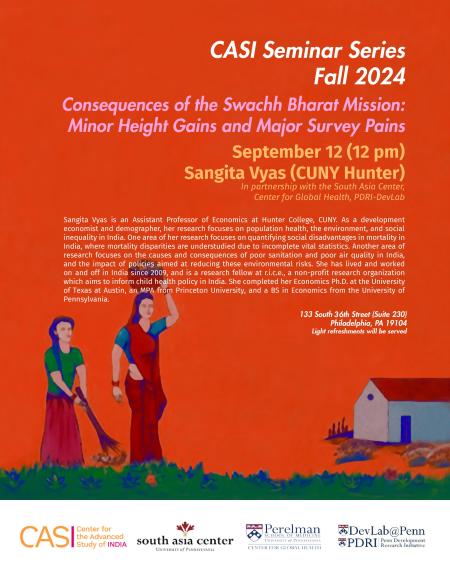Consequences of the Swachh Bharat Mission: Minor Height Gains and Major Survey Pains
Ronald O. Perelman Center for Political Science & Economics
133 South 36th Street, Suite 230
Philadelphia PA 19104-6215
About the Seminar:
Open defecation is an important contributor to disease burden and was exceedingly common in rural India. In 2014, the Government of India launched the Swachh Bharat Mission, which aimed to eliminate open defecation in India by October 2019. Nationally-representative survey data suggest the Swachh Bharat Mission contributed to a large decline in open defecation among rural households: from 55% in 2015-16 to 27% in 2019-21. Over the same period, the average rural child’s height, an important indicator of human capital, also increased by about one-fifth of a standard deviation. Using decomposition techniques that control for fixed differences across districts, and changes in other characteristics within districts, this seminar discusses how the reduction in open defecation statistically accounts for about one-fifth of the increase in child height during this period. This improvement is smaller than expected based on the height-sanitation relationship in earlier periods in India and in other countries. A weaker relationship in recent years is consistent with increased under-reporting of open defecation in response to survey questions. Respondents may have been fearful of reporting open defecation in the survey because coercive tactics were commonly used to compel rural households to build and use latrines. This research highlights the consequences of coercive policies for measurement of self-reported behaviors in surveys.
About the Speaker: Sangita Vyas is an Assistant Professor of Economics at Hunter College, CUNY. As a development economist and demographer, her research focuses on population health, the environment, and social inequality in India. One area of her research focuses on quantifying social disadvantages in mortality in India, where mortality disparities are understudied due to incomplete vital statistics. Another area of research focuses on the causes and consequences of poor sanitation and poor air quality in India, and the impact of policies aimed at reducing these environmental risks. Sangita has lived and worked on and off in India since 2009, and is a research fellow at r.i.c.e., a non-profit research organization which aims to inform child health policy in India. She completed her Economics Ph.D. at the University of Texas at Austin, an MPA from Princeton University, and a BS in Economics from the University of Pennsylvania.
Sangita Vyas is an Assistant Professor of Economics at Hunter College, CUNY. As a development economist and demographer, her research focuses on population health, the environment, and social inequality in India. One area of her research focuses on quantifying social disadvantages in mortality in India, where mortality disparities are understudied due to incomplete vital statistics. Another area of research focuses on the causes and consequences of poor sanitation and poor air quality in India, and the impact of policies aimed at reducing these environmental risks. Sangita has lived and worked on and off in India since 2009, and is a research fellow at r.i.c.e., a non-profit research organization which aims to inform child health policy in India. She completed her Economics Ph.D. at the University of Texas at Austin, an MPA from Princeton University, and a BS in Economics from the University of Pennsylvania.

